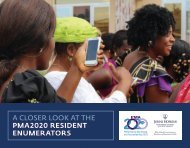1K856Ag
1K856Ag
1K856Ag
Create successful ePaper yourself
Turn your PDF publications into a flip-book with our unique Google optimized e-Paper software.
18 | PMA2014 ETHIOPIA DETAILED INDICATOR REPORT<br />
In each selected enumeration area, field supervisors randomly selected up to three private SDPs<br />
to be interviewed by a resident enumerator using the SDP questionnaire. The field supervisors<br />
themselves administered the SDP questionnaires at an additional three public SDPs that serve<br />
each enumeration area.<br />
The SDP questionnaire collected information about the provision and quality of reproductive<br />
health services and products, integration of health services, and water and sanitation within the<br />
health facility.<br />
Training<br />
The PMA2014/Ethiopia fieldwork training started with a two-week training of trainers of 5 regional<br />
coordinators, 30 field supervisors, and 3 central staff that was conducted from October 28 to November<br />
8, 2013. The training was led by PMA2020 staff from the Bill & Melinda Gates Institute for Population<br />
and Reproductive Health. These field supervisors then became the trainers for four subsequent<br />
resident enumerator training sessions, with the first two trainings taking place from November 20 to<br />
November 30, 2013 in Bishoftu and January 1st to 4th, 2014 at Red Cross Training Center in Addis<br />
Ababa. In addition, concurrent trainings in Addis Ababa, Gondar, and Mekele towns were held<br />
January 14 to 24, 2014; a total of 200 resident enumerators received training.<br />
All training participants were given comprehensive instruction on how to complete the household,<br />
female, and SDP questionnaires. In addition to PMA2020 survey training, all participants received<br />
training on contraceptive methods by an Ethiopian obstetrician/gynaecologist.<br />
Throughout the trainings, resident enumerators and supervisors were evaluated based on their<br />
performance on several written and phone-based assessments, mock field exercises and class<br />
participation. As all questionnaires were completed on project smartphones, the training also familiarized<br />
participants with Open Data Kit and smartphone use in general. All trainings included three<br />
days of field exercises, during which participants entered a mock enumeration area to practice<br />
listing, mapping and conducting household, female and SDP interviews; recording all responses<br />
on their project phones; and submitting to a practice cloud server—a centralized data storage<br />
system. The resident enumerator trainings were conducted primarily in Amharic, whereas some<br />
small group sessions were conducted in Afan Oromo and Tigrigna.<br />
Supervisors received additional training on how to oversee fieldwork and complete household<br />
re-interviews used to carry out random spot-checks in 10 percentage of the households interviewed<br />
by resident enumerators.<br />
Data collection was conducted between January and March 2014.



